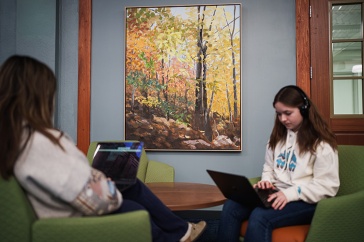
Tom Haines was in his basement, waiting for a technician to finish hooking up a natural gas line.
“The technician is telling me, ‘Oh, natural gas is great, it’s so fuel efficient and so cheap, this will be awesome,’” Haines, an associate professor of English, recalls. “But I’m from Pennsylvania, where fracking is big, and I know the reason why natural gas is so cheap.”
The conversation got Haines thinking — how did the natural gas get to his home? What was happening at the other end of that gas line, and what did it say about our historical relationship with the Earth, our present industrial world and a sustainable future?
He set out to research those and other questions for his upcoming book, “Walking to the Sun.”
“One of the biggest characteristics of our industrial life is that we’re dislocated from everything. With the exception of filling up your gas tank, we don’t ever really see the sources of our fuel,” Haines says.
That’s why the humanities are such a crucial component of sustainability. Often treated as a purely technical issue, sustainability is, at its core, about values, culture and history — fields of inquiry central to the humanities.
“The whole concept of sustainability is a collective aspiration,” says Tom Kelly, UNH’s chief sustainability officer. “It’s about a set of values and rights and arrangements that allow and support diverse approaches to human flourishing.”
Looking at sustainability through the lens of the humanities provides new angles on old problems. It’s an approach that, like Haines’ examination of fuel sources, looks at sustainability from the ground up, probing not just why sustainability is important, but who participates, what communities need, how politics influence technology, the difference between surviving and thriving and hundreds of other questions.

Pursuing answers to those questions is a fundamental part of the university’s mission, according to Heidi Bostic, dean of the College of Liberal Arts. And the effects ripple out from the faculty, staff and students engaged in research into the wider world.
“The Grand Challenges for the Liberal Arts Initiative is rooted in a deep and broad notion of sustainability,” Bostic says. Problems like climate change, food sovereignty and global health are facets of sustainability, and solving them requires a broad look at history, culture and the arts.
“Humanities provide a long view, instead of jumping at whatever solution is presenting itself to us that day, and seeing the deep roots of some of these issues,” Bostic adds.
Digging into the roots of sustainability and the challenges related to it requires a commitment to diversity, inclusion and collaboration. For Bostic, the ways the humanities respond to the challenge of sustainability are similar to the ways ecosystems respond to change.
“The more diverse we are, the more inclusive we are, the more resilient we are to challenges,” she says. “We can take consolation in the fact that complexity can help us if we embrace it. These problems we’re trying to tackle aren’t going to be solved in a day.”
Read more about the overarching story of sustainability at UNH here:
-
Blue and White and Green All Over
-
Farm to Future
-
A Carbon-Neutral Future
-
Starting Somewhere
-
People Power
Originally published in UNH Magazine Fall 2017 Issue
-
Written By:
Larry Clow '12G | UNH Cooperative Extension
















































